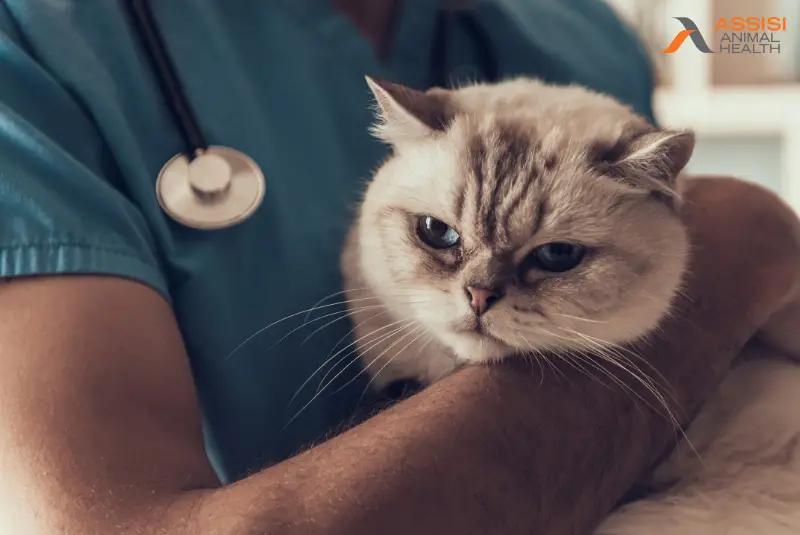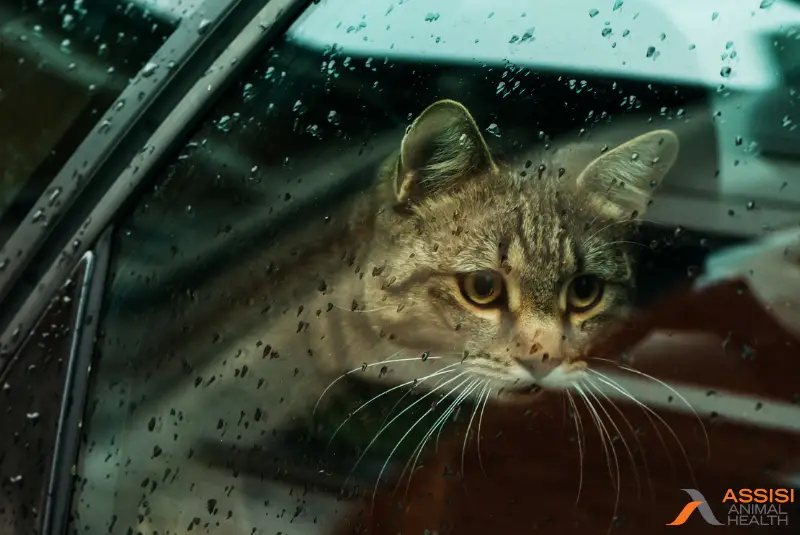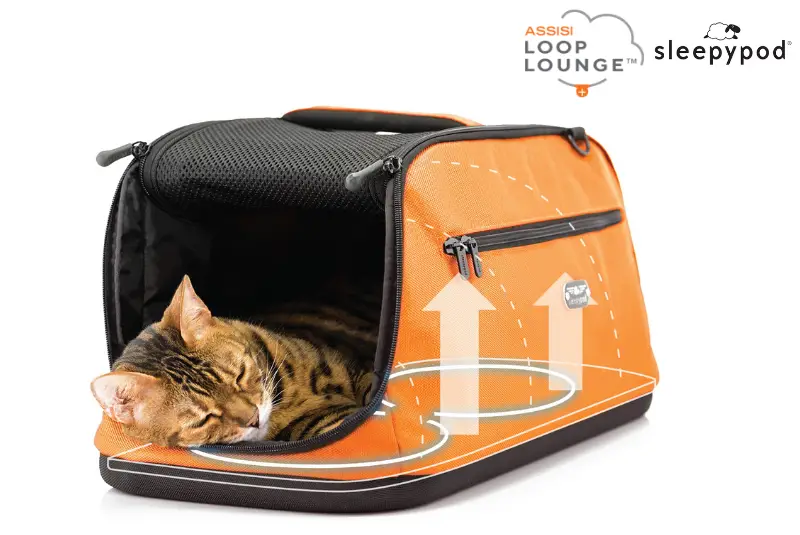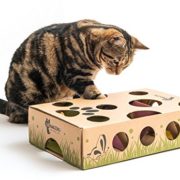Looking back on 2018, aside from the good, it was also a year filled with natural disasters from coast to coast. Multiple floods, tornados, hurricanes, storms and perhaps most devastating the camp fires.

Cat lovers are a unique, wonderful and close knit community. We share our successes with each other (our failures too) on social media, so we all benefit from the experiences of our fellow cat lovers, be it new healthy foods, great litter, fun toys or important advances in feline health-related issues. We encourage everyone to keep sharing their experiences.
The words natural disaster should be coupled with the word “preparedness.” We ask each of you to think about how prepared you are to “move” on a moment’s notice. It is rare that disaster happens without some notice, but the time to think about it is NOT when the water is at your back doorstep, NOT when the trees are falling in your yard, NOT when you have waited so long that you and your pets cannot get out. Preparedness can happen well before a disaster, in fact it can be planned and stored for immediate use.

Looking back at the needs based on disasters this year, we thought it valuable to reflect on the following:
1. Keep your vaccines up to date, and know where proof of them exists. Start an envelope today into which you will put paperwork that might be needed if you have to flee over state lines, or go to a shelter or boarding kennel that requires proof of vaccines.
2. Get your feline micro chipped. In disasters, cats can hide if they are outside, or escape even from your own hands if they are nervous or just plain scared. They will run – it is always a good plan to have a way for them to get back home when they are found. Almost all vets and shelters have a universal chip reader.
3. Have a crate at the ready. If you have any notice that a disaster is oncoming, get the cat into the crate and avoid having to try and find him/her when the need to evacuate is on top of you. Have food, litter and meds in a small bag at the ready, or already in the car.

4. Make sure you have researched hotels that take animals, what is available in your community should the need arise, know some of the local guidelines and certainly know the escape route. These are all items that can be handled well in advance.
5. Leave a note on your door that you have evacuated, and taken your pets with you. This helps rescue workers to move on and help those who have not prepared!! And do not return to your property until you have been cleared to do so.
6. Being prepared allows you to make good decisions for yourself and your pets, because you are not making those decisions in crisis conditions, but have had time to think!
The outcomes from the most recent camp fires have been tough on our felines. The most common injury so far is burning and respiratory distress. Our thanks to the legions of vets, techs, and volunteers on site. The California Veterinary Medical Foundation has been organizing visiting vets and animal care. The North Valley Animal Disaster Group has been on site, and still is, working with Butte County and partnering with other animal groups to accommodate all animals in distress.
Among the many who have assisted are our friends at Assisi Animal Health who have dispatched funds to California, product to vet clinics who have reached out for help, and their new Loop Lounge to clinics to assist in wound healing and burn recovery. There is still so much more to do, and the recovery ahead is long-term.
Let’s be prepared for ourselves, for our animals, and for our communities. It’s a great way to begin 2019.




Brilliant article Richard! So important to be prepared. I hope lots of people will read this, especially those in areas likely to flood, suffer from fires or other natural disasters.
Hi,
Thank you for these preparedness tips — which can never be said too many times. I would like to add that cat owners should also have a ready bag or bin of some sort pre-packed with spare medications (so you don’t have to run around finding them), food and we strongly recommend freeze-dried such as Primal or Whole Life Pet because (1) they are very high quality; (2) they can be served wet or dry depending on the cats’ preferences; and (3) they are light-weight compared to cans and heavy bagged kibble, and you don’t need a can-opener. The preparedness kit should also include something like an H-Harness and leash for using inside the hotel room (or at the very least a collar with bell) after the story I heard where a woman traveling lost her cat in a hotel and had to keep going to her destination across the country, and the cat was found hiding in the sofa. My emergency container also includes Calming Spray, fold-up food/water bowls, a camping set of utensils for stirring the food as our cats like Primal wet, and a couple of catnip toys.
Thanks again!
Sarah
I lost my precious Sita in a fire 5 years ago March 1. Although I realize you can’t be prepared for everything, I did learn a few lessons-after being dragged out by my ankles trying to reach Sita and spending a month in the hospital. “There MUST be things we can do!”
1. Get those stickers that go on your doors or windows letting fire Dept know you have precious fur balls inside! I have one on my front door & one on my back door.
2. Train your babies not to be afraid of their crates or carriers-it makes it easier to get them in in a hurry. Keep the crate/carrier in one place, easy to get to in an emergency.
3. If possible, socialize your kitties so they don’t run and hide everytime a stranger comes around
4. I now keep a go-bag, something that has duplicate documents, medications, treats for my new baby and whatever else you would want if you only have minutes to get out-or less.
I’ve also trained Leela to come when called and, because I frequently have paramedics here and the corner that I live on is the start of my towns 2 parades; i’ve Gotten her excited to see the fire trucks and ambulance. I also live in a tiny town and people know what I went through after the fire; so i’ve Actually had the guys from the fire Dept stop by and check on me when things have happened in our neighborhood-like a VERY unexpected tornado last fall that damaged the house. While Leela was scared to death and ran and hid when it first hit, (as I also did..as I said, you don’t expect to see the tell-tale green sky and hear the train-like roar in the northern Poconos. Friends tease me that they followed me up here from North Alabama), as soon as it was over, she came running to me. The last time the fire Dept checked on me, (the house next door had a fire), they actually brought some treats for Leela & she gave them kisses & hugs. She’s become very well-known around here with kids coming to ask if they can take her for a walk.
Along with micro-chipping and everything else suggested above; hopefully we can keep our babies from suffering. Because the fire started and spread so fast, my vet said that he didn’t think Sita suffered..physically. What hurt the most was knowing how scared she had to have been-she was very skittish, especially of loud noises and strangers in her house.
NOW? I have a nuttycat who goes in circles, runs from window to window trying to see fire trucks and ambulances..gives kisses and hugs to firemen and paramedics (and mail carriers, delivery people, etc), tries to get on the stretcher with me when I have to go in..AND loves to play hide and seek with me, her toys and her carrier. 🙄😂
Sometimes I feel like Leela is more like a 4yr old child than a cat! (Especially at Christmas! 😂)
I love that your community is so supportive.
confusion starts when you have three cats and can’t get your head wrapped around the ways in which you can take all of them to safety in time 😰
My cats won’t get in a cage. I have to call an expert who gets them into a cage that closes automatically, and he doesn’t dare touch them.
Also, my cats panic if I close the window, because they know it’s a sign of being taken to the vet, so I need a place with a cat-proof fenced-in yard for them.
Luckily, where I live, we never had a natural disaster.
Of course, there’s always a first time…